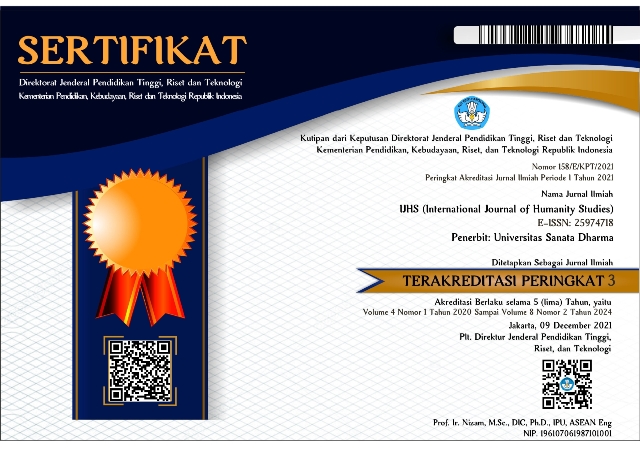GENDER DIFFERENCES AND THE USE OF METADISCOURSE MARKERS IN WRITING ESSAYS
Abstract
Keywords
Full Text:
PDFReferences
D'angelo, L. (2008). Gender identity and authority in academic book reviews: An analysis of meta discourse across disciplines. Linguistica e Filologia, 27, 205-221.
Dardjowidjojo, S. (2006). The implementability of Western approaches in Eastern societies. Indonesian Journal of English Language Teaching, 2(1), 1-20.
Hyland, K. (2005). Metadiscourse: Exploring interaction in writing. Journal of Pragmatics, 40, 12321248.
Lakoff, R. (1975). Language and womans place. New York: Harper Colophon.
Lodico M. G., Spaulding D. T. & Voegtle K. H. (2006). Methods in educational research: From theory to practice. New York: Wiley.
Matei, M. (2011). The influence of age and gender on the selection of discourse markers in casual conversations. Bulletin of the Transilvania University of Bra?ov. Series IV: Philology and Cultural Studies, 4(53), 213-220.
Pasaribu, T. A. (2017) Male and female students use of textual discourse markers in writing academic essays. Journal of Language and Literature, 17(1).
Serholt, S. (2012). Hedges and boosters in academic writing: A study of gender differences in essays written by Swedish advanced learners of English. Retrieved from http://hdl.handle.net/2077/29526
Seyyedrezaie, Z. S. & Vahedi, V. S. (2017). Projecting gender identity through metadiscourse marking: Investigating writers stance taking in written discourse. Indonesian Journal of Applied Linguistics, 6(2), 301-310.
Shirzad & Jamali. (2013). Gender differences in EFL academic writing. New York: Lambert Publishing.
Subon, F. (2013) Gender differences in the use of linguistic forms in the speech of men and women in the Malaysian context. IOSR Journal of Humanities And Social Science (IOSR-JHSS),13(3), 67-79.
Tse, P. & Hyland, K. (2008). Robot Kung fu: Gender and professional identity in biology and philosophy reviews. Journal of Pragmatics, 40(7), 1232-124.
Wahab, A. (2006). Isu linguistik: Pengajaran bahasa dan sastra. Surabaya: Airlangga University Press.
Waskita, D. (2008). Differences in mens and womens ESL academic writing at the University of Melbourne. Jurnal Socioteknologi, 7(14).
Yeganeh, M. T. & Ghoreyshi, S. M. (2015). Exploring gender differences in the use of discourse markers in Iranian academic research articles. Procedia - Social and Behavioral Science, 192, 684 689.
DOI: https://doi.org/10.24071/ijhs.v1i1.683
Article Metrics
Abstract view : 3638 timesPDF view: 1416 times
Refbacks
- There are currently no refbacks.
Copyright (c) 2017 Truly Almendo Pasaribu
Indexed and abstracted in:
IJHS Sinta 3 Certificate (S3 = Level 3)
International Journal of Humanity Studies (IJHS) has been nationally accredited Sinta 3 by the Ministry of Education, Culture, Research and Technology of the Republic of Indonesia based on the decree No. Surat Keputusan 158/E/KPT/2021. Validity for 5 years: Vol 4 No 1, 2020 till Vol 8 No 2, 2024

This work is licensed under CC BY-SA.
Creative Commons Attribution-ShareAlike 4.0 International License.
p-ISSN: 2597-470X (since 31 August 2017); e-ISSN: 2597-4718 (since 31 August 2017)
International Journal of Humanity Studies (IJHS) is a scientific journal in English published twice a year, namely in September and March, by Sanata Dharma University, Yogyakarta, Indonesia.
Note: The opinions expressed in this publication are those of the authors. They do not purport to reflect the opinions or views of the editorial team or publishers.

















